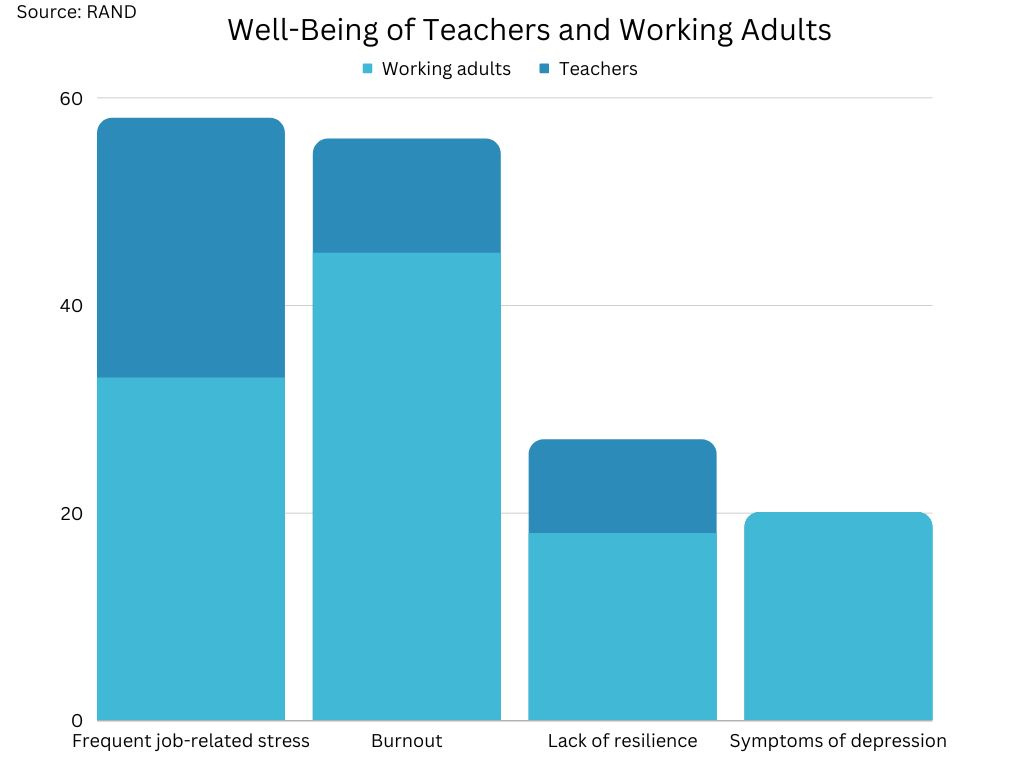More Than Half of Teachers Report Burnout and Frequent Job Stress. It's Better News Than You Think.
One in four teachers said they were likely to leave at the end of this school year, says a new survey. But things are better than during the pandemic.
Warning Bell is a new newsletter focused on the incredible stress being put on the teaching profession, and on teachers themselves. My name is Stephen Noonoo—I’m a longtime education journalist and editor for Edutopia, EdSurge, THE Journal and elsewhere.
If you like this post, please subscribe and recommend this newsletter to others. Thoughts? Suggestions? Reply to this email to reach me. And if you’re a teacher or former teacher with a story to share, I’d love to hear from you. Thanks for reading!
In case there was any lingering doubt, teachers are still far more stressed out than other professionals—and more than half of all teachers still report experiencing burnout and frequent job-related stress, according to one new survey.
The good news? Fewer teachers reported stress, burnout and a desire to leave their jobs than during the previous two years, indicating some return to normalcy following the height of pandemic chaos.
Still, nearly one in four teachers indicated they were likely to leave their jobs at the end of the school year—with Black teachers significantly more likely to express a desire to leave than their peers of other races. That tracks with similar data collected in 2021.
The data comes courtesy of RAND’s annual State of the American Teacher report for 2023, a nationally representative survey of 1,439 K-12 teachers. In its report, RAND contrasted the results with a separate survey of workers across professions—which found much lower levels of job-related stress (33 percent of workers) and burnout (45 percent).
In 2021 and 2022, more than 70 percent of teachers (!) reported frequent job-related stress (it was 78 percent in 2021). Last year, 59 percent of teachers said they’d experienced burnout.
So, what about those teachers who are looking to leave? The report offered a few clues as to why, and most cite the typical litany of justifiable grievances. The stress and disappointments of the job aren’t worth it. The pay stinks. And the hours are unreasonable.
There were other challenges too.
We’ve discussed both the teacher shortage and the difficulties of teaching through the culture wars in this newsletter—and all the attendant stresses it places on current teachers. And interestingly enough, the survey directly asked about politics: 16 percent of surveyed teachers said the “intrusion of political issues and opinions in teaching” was a significant source of job-related stress. (Forty-six percent cited student behavior, making it the top stressor).
Yet nearly all teachers are dealing with the political and cultural fallout anyway. A quarter of teachers said they have been asked by admins to “limit discussions about political and social issues in class.” But about two-thirds said they self-censor when it comes to such topics.
Here’s where it gets interesting—or at least telling. Half the teachers surveyed said they limit discussions about political or social issues because they’re not sure school leaders would have their back if parents complained. Also:
36 percent said they’re afraid of verbal or physical confrontations with parents; and
32 percent said they’re afraid of losing their job or teaching license.
We’ll end with a note from the report about the mental health supports teachers say they’re receiving: “Three-quarters of teachers reported that they had access to at least one well-being or mental health support (e.g., mental health care) in 2023, but only slightly more than half of all teachers indicated that these supports were adequate.”
Show & Tell
More on the RAND data from EdWeek:
“This is something that is very concerning to us,” said Elizabeth Steiner, a policy researcher at the RAND Corp. and an author of the report. The data, she said, is “a pattern that plays out in real life. Black teachers do turn over [and] leave their jobs at higher rates than white teachers.”
…
“Black teachers might have different financial considerations or pressures than teachers of other races and ethnicities,” Steiner said, citing student loan debt, which past research shows disproportionately falls on Black educators.
But also this:
Becker later says that admins are worried over “simply getting kids to school. They are worried about teacher turnover. They are worried, literally, about getting the busses to run on time. They are working their asses off.” (Twitter)
Independent Reading
A state commission in Georgia approved watering down teacher training rules to eliminate “fraught” terms like diversity in favor of say-nothing words like differences. “Changing language does change intent. Replacing the word ‘diverse’ with words like ‘different’ and ‘unique’ implies that there is a norm, a sameness, which excludes those who do not fit in,” said ACLU First Amendment policy advocate Sarah Hunt-Blackwell at the meeting. (The 74)
California’s teacher shortage is particularly acute when it comes to high poverty schools. That’s why the state is trying new initiatives around community schools and—yes—paying teachers more to work at them. A program that gives prospective teachers $20k toward their training if they work at high-poverty schools for four years, called the Golden State Teacher Grant Program, has already seen around 11,000 commitments. (CalMatters)
A former award-winning journalist, Alba Mendiola, switched to teaching and was the recent recipient of the News Literacy Project’s Alan C. Miller Educator of the Year award. Mendiola began a bilingual broadcast journalism class at her Chicago high school. (EdSurge)





